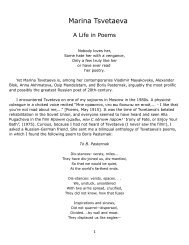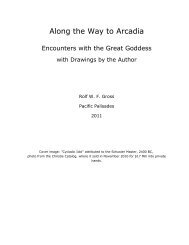A conventional l<strong>and</strong>scape, a villa in a park of willows, <strong>and</strong> a lake or river in the foreground. It could have been in Russia.And then she discovered the signature of the painter: Wassily K<strong>and</strong>insky, 1899. It was the first K<strong>and</strong>insky Alex<strong>and</strong>ra saw.Her friend Katharina rose before Alex<strong>and</strong>ra’s eyes, <strong>and</strong> she knew intuitively why Nina was crying.Nina tried to collect herself <strong>and</strong> confessed that K<strong>and</strong>insky had been her first lover two years ago, before he had desertedher, married a cousin of his, <strong>and</strong> eloped to Munich. She to wait fifteen years until he returned, driven by war <strong>and</strong> historyback to his native l<strong>and</strong>. Eventually the fifty-year-old K<strong>and</strong>insky married Nina. She became his last companion.Just before New Year a long letter from Deda arrived full of ominous messages, lamentations, <strong>and</strong> misgivings.Uncle Ilia was in trouble again. The Russian viceroy had ordered him out of Georgia before the New Year of the centurybecause the Russians expected a large demonstration for Georgian independence that night. He had been told to spendthe season in one of the Russian resorts in the Crimea—where he could be better supervised <strong>and</strong> could cause notrouble. Ilia, of course, was indignant. A long article in his defense in Iveria had caused additional tension. It had costOlga all her persuasion to take her upset husb<strong>and</strong> to Sevastopol by boat.When their steamer left Batumi, a demonstration in Ilia’s favor had taken place that had been dispersed by the Russianmilitia. Ilia left with mixed feelings, because the demonstration had for the first time been heavily infiltrated by the dubiousmembers of the new Georgian Socialist Party. A certain Soso Djugashvili, their main agitator, was a shady character withwhom Ilia would prefer not to be identified.Deda was frightened by the ominous clouds on the horizon of the coming century. Persephone had, in a lengthy trance,issued a terrible forecast of what the next century would bring: war, fire, murder, the death of thous<strong>and</strong>s of innocentpeople."Oh, well," said <strong>Konrad</strong> when Alex<strong>and</strong>ra read him the letter, "Der Untergang des Abendl<strong>and</strong>es, the decline of theOccident has been a favorite subject of the pessimist school of German Kulturphilosophie for several years, we don’tneed a mystic clairvoyant to bring this subject to our attention. The historians of philosophy cannot agree whether this isthe fin de ciecle or the dawn of civilization."Alex<strong>and</strong>ra, who had been pursued by similar visions since their arrival in St. Petersburg, berated him. Had he not himselfsaid that the Empire <strong>and</strong> the institution of the Tsar were ready to collapse? Didn’t he also feel that a revolution of themasses of dispossessed people was imminent? What would one do if that happened?<strong>Konrad</strong> sniggered. "Life has always been dangerous, it is only because the past few years have been so peaceful thatpeople are pursued by fearful premonitions. You are much more sensible than you admit to yourself, was it not your ideato counteract your fears by studying medicine? What to do? Exactly what you are doing!"But, she pointed out that her work had not assuaged her fears or ended her nightmares. "Maybe I should try to imaginehow such a collapse would look to be able to cope with my fears should it happen."<strong>Konrad</strong> shook his head. "Dearest woman, you are pregnant, that is most likely the reason for your nighhtmares. Brimus isdisturbing your peace of mind. The Gedankenexperiment, the thought-experiment you propose would put you into ahypersensitive, hysterical condition, which would be more dangerous for your emotional balance than your premonitions.Be alert, watch the evolution of events with your clear eyes <strong>and</strong> act very fast when necessary without regard to yourpersonal property, possessions, or safety."Alex<strong>and</strong>ra remembered the certainty she had experienced in front of van Gogh’s paintings, that her body <strong>and</strong> her eyeswould protect her from going insane. At this moment Brimus kicked her into the stomach. She sighed <strong>and</strong> with a laughgave Brimus a slap.She was, of course, not entirely wrong, thought <strong>Konrad</strong> later. The University was infiltrated with radicals, <strong>and</strong> because hewas a young docent who did not belong to the establishment, he was often approached by these people trying to recruithim to their various causes. <strong>Konrad</strong> had a deep-seated aversion to radicals <strong>and</strong> their theories: One could spot them bytheir poor clothing <strong>and</strong> emaciated looks. Not that they were all poor, that was their "uniform." The most rabid of themwere invariably women. They were brighter, <strong>and</strong> more determined than their male co-students.<strong>Konrad</strong> found the ideas of the radical extremists chaotic <strong>and</strong> irrational. They were almost without exception confusedpolitical dreamers, influenced by mystics. Many were religious fanatics, who in the hope of becoming a revered "martyr,"would willingly let themselves be rounded up <strong>and</strong> be taken to prison or sent to Siberia. There was no single leader thatunited them—if one excluded the old Tolstoi. The many groups fought each other more viciously than their commonenemy.Alex<strong>and</strong>ra had been inoculated by her father against religious <strong>and</strong> political fanaticism. Her Georgian background madeher a critic of the "system," not because of any vague philosophical idealism, but because the "system" was Russian. Hernewly acquired "socialism" was not a political ideology but practical humanism.But, thank God, he mused, Alex<strong>and</strong>ra had not yet been exposed to the worst in St. Petersburg. Every month thous<strong>and</strong>sof illiterate peasants streamed into the city <strong>and</strong> overcrowded the horrible slum dwellings that housed the factory workers.They worked <strong>and</strong> slept in shifts, two or three people to one bed. Mercilessly exploited, their life was much bettercompared to the villages where a decade ago their parents had still been serfs.Social friction was an inevitable consequence of these conditions, but this proletariat consisted of uneducated <strong>and</strong>unmotivated illiterates. They could not grasp the confusing slogans of the Socialist agitators. Only if they were drunk60
could they be aroused into communal action, which inevitably turned into blind mayhem <strong>and</strong> a bloodbath as soon as theCossacks appeared.Most educated people looked at this proletariat with cynical disgust, not fear. The Tsar, the police, the Okhrana, <strong>and</strong> themilitary would keep them under control. <strong>Konrad</strong> felt pity for them, but Alex<strong>and</strong>ra was frightened by their blind, benightedfanaticism.A revolution had to happen. It was only a matter of time.18.Otto's miraculous birth1900At four in the morning, in the still darkness, Alex<strong>and</strong>ra was shaken out of her sleep by the onset of her labor pains. Afierce contraction, more powerful than she had expected. She bit her lip <strong>and</strong> tried to relax as best as she could. <strong>Konrad</strong>was fast asleep beside her. Too early to wake him, she decided, <strong>and</strong> when the attack let up she turned onto her rightside <strong>and</strong> relaxed completely, letting her mind float.The last weeks passed by her inner eye in vivid pictures. Deda had insisted on coming to St. Petersburg to be with her,<strong>and</strong> Aunt Sophia had joined her on the long trip.Far from her husb<strong>and</strong> <strong>and</strong> the conventions of Tiflis, unimagined dimensions of Deda’s character had surfaced, anexpansiveness that occasionally bordered on the reckless.Deda had taken Alex<strong>and</strong>ra on an all but irresponsible tour of the fashionable cafes <strong>and</strong> stores, where she had indulged ina spontaneous shopping spree: French perfume, lingerie, clothes, a fur coat, even some expensive jewelry. She gavegenerous gifts to Alex<strong>and</strong>ra, a largess of which Alex<strong>and</strong>ra would not have believed her proper mother capable had shenot seen it with her own eyes: Tamunia-Deda, rejuvenated by several years enjoyed herself like the mistress of somerich man.Deda’s moods had the force of divine trials. For hours she would wallow in deeply tragic lamentations. "All my childrenhave left me. They have forgotten their beautiful country, why are they living in this cold <strong>and</strong> foggy Russian city? Look atme, a poor, neglected Georgian mother."Alex<strong>and</strong>ra, always conscious of her own occasional spells of the Georgian malaise, was tested to the limits of herpatience. But as suddenly as Deda had fallen into this seemingly bottomless self-pity, she would come out of it, tilt herhead to one side, flap her arms like a strange bird, <strong>and</strong> while her face was still suffering, she would pout <strong>and</strong> saysomething preposterously funny. These resurrections by her own power would invariably end in boundless merriment.One sunny morning, after days of gloomy, snowbound grayness, <strong>and</strong> Deda under the spell of the weather, <strong>Konrad</strong> hadsuggested a walk to one of the out-lying isl<strong>and</strong>s. There Deda suddenly snapped out of her mood. Giggling like a younggirl, she had started a snowball fight with <strong>Konrad</strong>. Alex<strong>and</strong>ra, too big to participate, had watched with enviousamusement.Two days later they got into a political argument over Ilia’s latest actions, which Tamunia-Deda, for an entire hour, foughtfor Ilia with heated ab<strong>and</strong>on.Not a dull day had passed during the last month.Meanwhile Sophia had taught Alex<strong>and</strong>ra yoga techniques to ease her delivery. The position on her right side was one ofthem. Sophia had for some time studied meditation <strong>and</strong> yoga with a woman from Central Asia in the hope of findingmethods to control the pains of delivery.She showed Alex<strong>and</strong>ra how to breathe evenly, relax completely, <strong>and</strong> let her mind drift. Sophia told her to let images driftinto her consciousness, look at them, <strong>and</strong> then dismiss them to make room for yet another image."And when the contractions come, pull up your legs, so you are as comfortable as possible, concentrate your mind onone of these images, <strong>and</strong> hold it before your inner eye. Your body will do the rest."Alex<strong>and</strong>ra listened to the clock chiming from the nearby church. Almost half an hour had passed since her firstcontraction. The second overtook her. It was less forceful. But then their pace quickened. They now came every fifteenminutes. In between she easily regained her balance.Lying half-asleep, half-awake, watching the images of her mind change from the outings with Deda into a series ofscenes from Venice <strong>and</strong> the Toscana, she lost all apprehension of the events to come. Her head was clear, her bodylimp.A new spasm slowly emerged from her center. She followed the pain as it radiated through her entire body. She was able61
- Page 3 and 4:
Table of Contents1. My Grandfather'
- Page 5 and 6:
1.My Grandfather's Watch among the
- Page 7 and 8:
ditch beside the road.Mother was tr
- Page 9 and 10: Deep snow still covered Djvari Pass
- Page 11 and 12: "But you know nothing about how to
- Page 13 and 14: newborn baby! You won’t need a ba
- Page 15 and 16: Dadiani bent over the table, reache
- Page 17 and 18: Autumn had come to Georgia, and it
- Page 19 and 20: "Gespenstisch!" whispered Mouravi t
- Page 21 and 22: Finally, depressed by his inability
- Page 23 and 24: They slowly rode up the hill north
- Page 25 and 26: On their way back to the Lavra Alex
- Page 27 and 28: Blushing like a young girl, she gav
- Page 29 and 30: Alexandra bowed deeply to a middle-
- Page 31 and 32: All applauded and Ilia made a small
- Page 33 and 34: She had done her hair up in a new w
- Page 35 and 36: ape her. But then he must die, and
- Page 37 and 38: a rear door when she entered.If Per
- Page 39 and 40: Alexandra went purple with embarras
- Page 41 and 42: The smell of roasting lamb wafted t
- Page 43 and 44: Konrad quietly sat back. To his gre
- Page 45 and 46: The tall, dark-haired woman began w
- Page 47 and 48: She kissed him."Maybe you dream of
- Page 49 and 50: 14.Tuscany - the Wolfsons' House in
- Page 51 and 52: ut are, unjustly, much more famous.
- Page 53 and 54: Alexandra had fallen into melanchol
- Page 55 and 56: She kissed him tenderly. "Niko, I a
- Page 57 and 58: obligations, and she, ever since th
- Page 59: months, was flooded with the diffus
- Page 63 and 64: 19.An unexpected encounter with Vla
- Page 65 and 66: chauffeur drop me at the station ju
- Page 67 and 68: She described her sensation of flyi
- Page 69 and 70: sky a thin, transparent blue. Imbed
- Page 71 and 72: interest in Theosophy."Marti shrugg
- Page 73 and 74: to?Mother had never mentioned any d
- Page 75 and 76: "Ah, of course, of course, ‘Eine
- Page 77 and 78: Konrad agreed that this sounded mor
- Page 79 and 80: patriarchal oak and smiled, a littl
- Page 81 and 82: have a similar situation in our vil
- Page 83 and 84: Alexandra disagreed. "Most abortive
- Page 85 and 86: a limited edition, hand-screened ma
- Page 87 and 88: Alexandra touched her necklace and
- Page 89 and 90: close!"She had hugged him, tears ru
- Page 91 and 92: The others came lumbering up the st
- Page 93 and 94: urden the heart with this task, whi
- Page 95 and 96: the colors mixed and changed depend
- Page 97 and 98: 28.Kandinsky's suprising confession
- Page 99 and 100: With kisses Alexandra removed the v
- Page 101 and 102: He knelt, removed her knee and leg
- Page 103 and 104: Joachim viewed Konrad with sympathe
- Page 105 and 106: The rumbling continued at regular i
- Page 107 and 108: Russia."She picked up a piece of br
- Page 109 and 110: conservative pessimism, demanded th
- Page 111 and 112:
preventative method and taking it e
- Page 113 and 114:
new provocation in modern music and
- Page 115 and 116:
exhausted the Renaissance idea of b
- Page 117 and 118:
creative clairvoyance, and her shar
- Page 119 and 120:
Left to herself, Alexandra, awed, w
- Page 121 and 122:
public. She fended off the fuzzy wo
- Page 123 and 124:
ailways on strike. The strike had t
- Page 125 and 126:
Grandfather was very sad when he fo
- Page 127 and 128:
and put on his coat and shoes, he r
- Page 129 and 130:
Alexandra not in the mood to give V
- Page 131 and 132:
crowd of the fashionable and the ma
- Page 133 and 134:
established tradition with some mil
- Page 135 and 136:
42.Uncle Muravi's Benz, Tiflis1907"
- Page 137 and 138:
equisitioned a locomotive to take t
- Page 139 and 140:
meaningless rituals. That may be on
- Page 141 and 142:
lacking. I like this man, and at th
- Page 143 and 144:
are suitably ambiguous."45.The Dadi
- Page 145 and 146:
think of Munich or something else p
- Page 147 and 148:
He showed them the room where they
- Page 149 and 150:
death."Alexandra was more intereste
- Page 151 and 152:
they fought over the offering. The
- Page 153 and 154:
flew off cawing.Claudia grabbed Ale
- Page 155 and 156:
Together they were hedging out a pl
- Page 157 and 158:
the right of women to own their bod
- Page 159 and 160:
The Chinese wife of a sinologist at
- Page 161 and 162:
these texts."However, Ch'an is the
- Page 163 and 164:
times, but moved back together agai
- Page 165 and 166:
survived the Bolsheviks, the Fascis
- Page 167 and 168:
physically overwhelm her. Despite h
- Page 169 and 170:
Konrad picked up Alexandra at the t
- Page 171 and 172:
Abruptly her vision had narrowed, a
- Page 173 and 174:
the Kwadjagani, the Masters of Wisd
- Page 175 and 176:
somewhat, his back was still bent,
- Page 177 and 178:
century. The characteristic Chinese
- Page 179 and 180:
Alexandra was relieved and happy, a
- Page 181 and 182:
subconscious past her observant min
- Page 183 and 184:
Dahl leaned back in surprise. "This
- Page 185 and 186:
visions reappear. Entire armies mar
- Page 187 and 188:
"This method is not easy, I have ne
- Page 189 and 190:
He had started with representationa
- Page 191 and 192:
His hair had turned completely whit
- Page 193 and 194:
Overnight the mood in St. Petersbur
- Page 195 and 196:
daughter. His wife had left him no
- Page 197 and 198:
which was presented to him—with a
- Page 199 and 200:
"From the soldiers whom I took care
- Page 201 and 202:
He watched Alexandra’s doubting m
- Page 203 and 204:
lond, bony girl whose gray eyes loo
- Page 205 and 206:
call it intellectual humanism. It d
- Page 207 and 208:
time I asked this question I had me
- Page 209 and 210:
"I spent most of the winter of 1918
- Page 211 and 212:
We buried him in the cemetery at G
- Page 213 and 214:
ways. Corruption became the way of
- Page 215 and 216:
68.A Concert in Kreuth - Eliso1989I
- Page 217 and 218:
Eliso listened with increasing fasc
















